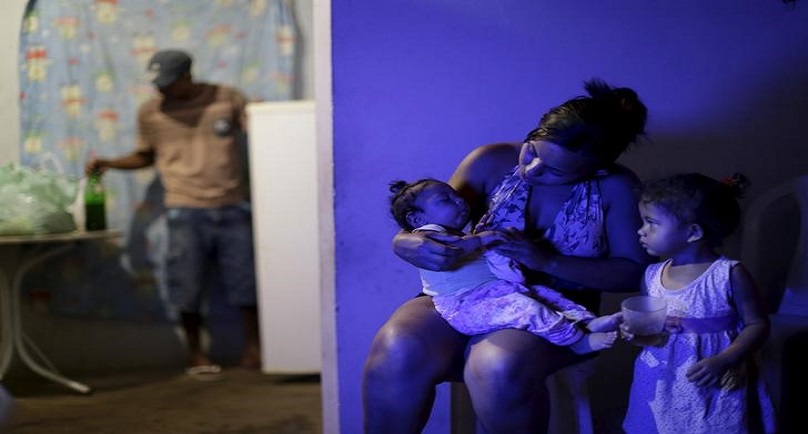Image: Rosana Vieira Alves holds her 4-month-old daughter Luana Vieira, who was born with microcephaly, as her daughter Laiane Sophia looks on at their home in Olinda, Brazil, February 2, 2016. REUTERS/Ueslei Marcelino
By Julia Symmes Cobb and Luis Jaime Acosta
BOGOTA (Reuters) – Colombia, seen as a key test case for the impacts of a Zika outbreak, is reconsidering its own forecast of babies likely to be born with a rare birth defect linked to the mosquito-borne virus, indicating that it may be too high.
In an interview, Health Minister Alejandro Gaviria suggested the Andean nation may revise downward its projection of 500 to 600 cases of Zika-linked microcephaly, as the condition, marked by an abnormally small head, has not yet shown up in fetal ultrasounds.
That forecast would represent a fivefold spike in the number of Colombian microcephaly cases seen on average each year.
“We’re doubting that figure. We’re analyzing what’s happening in Brazil, but between when we released the estimate and now we haven’t found a single case of microcephaly,” Gaviria said.
“The extrapolation of Brazil’s figures to Colombia, which is how we got the projection, now doesn’t seem reasonable.”
Much remains unknown about Zika, including whether the virus actually causes microcephaly.
An outbreak of the virus was first detected in Brazil early last year and is now spreading rapidly through the Americas. Brazil has so far been the only country to report a spike in cases of the birth defect, with more than 4,400 reported cases, of which more than 500 have been confirmed as microcephaly.
Most of the cases have been seen in two states in Brazil’s northeast, raising the question of whether Zika’s spread will lead to more microcephaly elsewhere.
Zika arrived in Colombia in October, and the country has reported 31,555 cases, over 5,000 of them in pregnant women. If the virus does cause microcephaly, women who were infected then and were early in their pregnancies could begin to see signs of the deformity via ultrasound.
But it may take several more weeks, or months, as signs of microcephaly may only be detected very late in pregnancy, experts say.
“Colombia is going to tell us a lot if this link between Zika and microcephaly is really associated. At the moment it is only in Brazil,” Dr. Marcos Espinal, director of the department of communicable disease at the Pan American Health Organization, the regional arm of the World Health Organization, said at an event on Wednesday.
“If Zika is really the cause of microcephaly, we should expect to see microcephaly cases in Colombia in June,” Espinal said.
Colombia in the past has reported a relatively higher incidence of microcephaly, relative to its population, than Brazil, suggesting there may have been under-reporting in the larger country, Gaviria said.
The Zika virus has also been linked to Guillain-Barre syndrome, which can cause paralysis. The ministry expects around 60 cases of the syndrome monthly, an increase of 50 percent, Gaviria said.
Three deaths from Guillain-Barre have been linked to Zika in Colombia. One patient tested positive for the virus, while the other two were diagnosed by doctors but did not have their cases confirmed by a lab, he said.
(Reporting by Julia Symmes Cobb and Luis Jaime Acosta; Additional reporting by Julie Steenhuysen in Chicago; Editing by Helen Murphy, G Crosse and Leslie Adler)
Copyright 2015 Thomson Reuters. Click for Restrictions.


